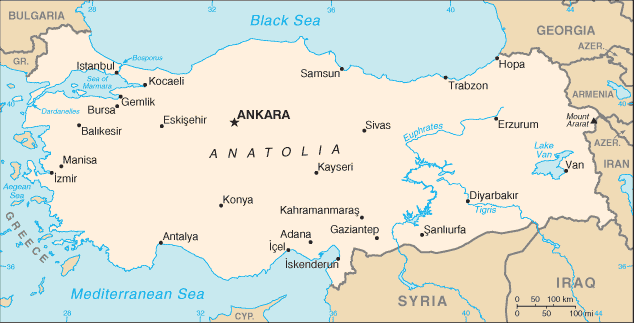Turkey
The Republic of Turkey or Turkey, is a bicontinental country located between Southwest Asia and partly in Southeast Europe. Anatolia (Asia Minor), the landmass that is now Turkey, had been a cradle to a wide variety of civilizations and kingdoms in antiquity. The Seljuk Turks were the first Turkish power to arrive in the 11th century as conquerors (earlier Turkish peoples such as the Pechenegs had become allies and subordinates of the Byzantine Empire), who proceeded to gradually conquer the existing Byzantine Empire with its Greek population and heritage. Their Turkish successors, the Ottoman Empire (named after its first leader Osman Gazi), began as a small tribe of nomadic Turks who would come to dominate the region for 600 years. Its first capital was located in Bursa in 1326 and by 1453 under Sultan Mehmed II the Ottomans would conquer the last stronghold of the Byzantine Empire, Constantinople (see fall of Constantinople). The empire reached its peak under Sultan Suleyman the 'Magnificent' between 1520-1555, the empire stretched from the gates of Vienna to the Persian Gulf, from the Crimea to Morroco. Throughout the 19th and early 20th century the Ottoman empire began to lose a foothold on its territories, first with Algeria and Tunisia, then Greece, Egypt, Libya and the Balkans in the 1912 Balkans war. Faced with territorial losses on all sides Turkey forged an alliance with Germany who supported it with troops and equipment. In World War I Turkey entered the war on the side of the Central Powers (Germany, Austria-Hungary) and was subsequently defeated. On October 30th 1918, the Mondros Armistice was signed followed by the Treaty of Sèvres on August 10th 1920. These sought to break up the Ottoman empire and force large concessions on Turkey in favour of its rival Greece who had fought against the Germans. Greece, France and Italy were awarded parts of the coast of Minor Asia. The city of Izmir (Smyrna), with its large Greek population, was awarded to Greece. The Greek army took it over on May 15 1919 and triggered the War of Independence. A nationalist movement led by Mustafa Kemal, rejected the Sèvres and organised an army which repelled Greece from Turkey. By September 18th 1922 the country was liberated resulting in the Treaty of Lausanne of 1923, recognising the new borders of Turkey. On October 29th 1923 The Republic of Turkey was proclaimed and Mustafa Kemal, later taking the last name Atatürk (meaning father of Turks), would be her first president. On March 3, 1924, the National Assembly abolished the ministry of sacred law, all schools were placed under the ministry of education and a new constitution was approved on April 20, 1924. For the next 10 years, there was a steady process of secular westernization, guided by Mustafa Kemal. Atatürk's successor after his death on November 10, 1938 was Ismet Inönü. When all its western neighbours were under Axis occupation during World War II, Turkey signed a peace treaty with Germany and officially remained neutral until near the end of war. In 1945 Turkey joined the UN, and in February 1945 it declared war on Germany and Japan. This was largely symbolic, as no Turkish troops engaged in battle. Turkey joined the North Atlantic Treaty Organization (NATO) in 1952. The political system that emerged in the wake of the 1960 coup was a fractured one, producing a series of unstable government coalitions in parliament alternating between the True Path Party of Suleyman Demirel on the right and the Republican People's Party of Ismet Inonu and Bulent Ecevit on the left. A coup was staged in 1971, ousting a fractured parliament under the Prime Minsitry of Demirel. Under Prime Minister Ecevit in coalition with the religious National Salvation Party, Turkey carried out an operation in Cyprus in order to prevent a coup intended to unify the island with Greece, creating a conflict that to this day is still not resolved. The fractured political scene and poor economy led to mounting violence between ultranationalists and communists in the streets of Turkey's cities. A paralyzed parliament and increasing death-toll prompted a coup in 1980, once again on Demirel's watch. Within two years, the military had returned the government to civilian hands, but had banned Demirel, Ecevit, and a number of other politicians from politics for life. A new government was formed by ANAP and Ecevit's Democratic Left Party (DSP) supported from the outside by the center-left Republican People's Party (CHP), led by Deniz Baykal. Under this government, Abdullah Öcalan, the leader of the Kurdish separatist organisation PKK, was captured in Kenya. He was tried for treason and sentenced to death, but he has since sent the case to the European Court of Human Rights. The DSP won big in the 1999 elections on the strength of the Öcalan abduction. Second place went, surprisingly, to the Nationalist Action Party (MHP). These two parties, alongside Yilmaz's ANAP formed a government. The popular perception was that it would fail; these were, after all, the inheritors of the two groups that were fighting so violently in the streets during the 1970s. However, the government was somewhat effective, if not harmonious, bringing about much-needed economic reform, instituting human rights legislation, and bringing Turkey ever closer to the European Union. A series of economic shocks led to new elections in 2002, bringing into power the religiously conservative Justice and Development Party of former mayor of Istanbul, Recep Tayyip Erdogan. This article is licensed under the GNU Free Documentation License. It uses material from the Wikipedia article "Turkey".
|
|||||||||||

